Can things go wrong on a Greek vacation? For sure – and these mishaps can make for some fun memories. Here are ten things that can go wrong on the Greek islands, from personal experience 🙂

Things that can go wrong during a Greek island vacation
If you’ve been following my blog for a while, you probably know a bit about me. If not, I am Vanessa, I was born in Athens in 1974, and I’ve been to about 65 of the Greek islands, many of them more than once.
I thought I’d write a humorous article with Greek island mishaps in my 40+ years of travelling around Greece. Granted, none of those situations were much fun when they happened, but they are fun to think of today. Well, kind of.
Now, I need to explain that I’ve always liked travelling to remote and quiet islands, where the infrastructure is often very minimal. Also, many of these happened years ago. If you’ve been visiting Greece for several decades, you may have also experienced some (or all) of these and you’ll probably get a good laugh.
So – here we go – here are ten things that have gone wrong during my Greek island holiday.
1. I got stranded on an island for a week, as the ferry never arrived
Back in the 90s, there were way fewer ferries in Greece than there are today. At the time, there were extremely few ferries connecting Piraeus port with the more remote islands – there would often be ferries only once or twice a week.
I will never forget that time when my partner and I went to Agios Efstratios, a remote Northern Aegean island. The weather was extremely windy, and after a few days we decided to leave.
Guess what? Due to the winds, the ferry couldn’t approach the port, so it never came to pick us up. We were (literally) stuck on the island for a whole week!
Those glorious days, no ATMs existed on many of the islands, and I believe we didn’t even have cards with us. We eventually ran out of money, and couldn’t buy our ferry ticket back to Athens.
At the time, ticket control didn’t happen at the time of boarding, so when the ferry to Athens eventually arrived, we went in, hoping that nobody would discover two young stowaways. Unfortunately, they did, and we were told we’d be taken to the police station upon arrival – not good!
In the end, the ferry captain had the crew issue us free tickets… all well that ends well. And, although this is a super embarrassing story, it makes me giggle these days.
These days, you can use search engines like Ferryhopper or Ferryscanner to easily book your ferry tickets in Greece – and of course, credit cards work everywhere.
Verdict: It’s important to know that ferries, and even flights, CAN sometimes still get delayed or cancelled due to strong winds or other reasons. This is why I always recommend using the slower ferries, that are safe to travel in most types of weather.
Also, leave lots of time between your flight and your ferry trip – PLEASE don’t plan your flight home on the same day after a ferry trip. Always best to wait a bit longer, or spend your last night in Athens, than to miss your connection. And consider getting travel insurance as well.

2. I got a sunburn
I hate to admit it, but I haven’t always been super careful with staying out of the sun, especially when I was younger. These days we all know how bad the sun is for our skin, but a few decades ago it wasn’t so well-known.
Sunburn means red, painful skin that stings, and eventually starts peeling. This can happen if you’ve been out in the sun for too long – and in fact it can happen even if you mostly stay in the shade.
If you visit Greece, PLEASE make sure you use sunblock and a hat, especially during the warmer months, April to October. Also, avoid the sun as much as possible. This is even more if you have fair skin – I can’t stress it enough. My partner, Dave, is from the UK, and I believe that says it all 🙂
You can easily buy sunscreen in Greece at pharmacies, cosmetics stores like Hondos, supermarkets, and tourist shops. Or you can bring your own.
I’m sure everyone has their favorite brands. I like La Roche Posay, Neutrogena and also Hawaiian Tropic, but there are so many others. Make sure you apply it frequently and liberally.
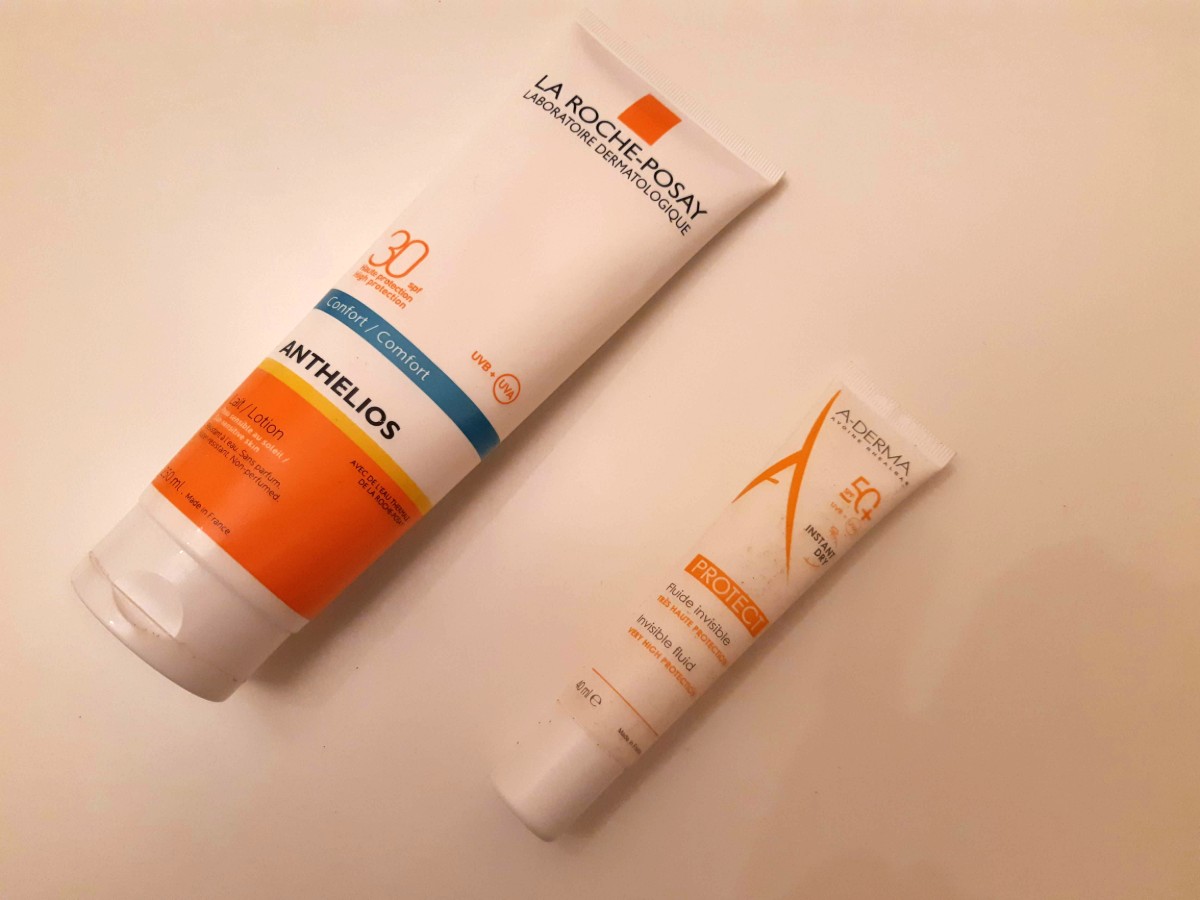
3. I got heat exhaustion
Even worse than sunburn, I’ve also had heat exhaustion a couple of times in my life. This is a type of hyperthermia, where your body overheats. My symptoms were headache, dizziness and vomiting, which led to pretty severe dehydration. Luckily I didn’t have to go to hospital.
Heat exhaustion and, even worse, sunstroke, can be very dangerous conditions. In extreme cases, they can even lead to death in certain individuals. Infants, the elderly, pregnant women and other categories of people are more susceptible, and should definitely take precautions.
Please make sure you do not overexert yourself when you visit Greece in the summer, stay in the shade, and drink plenty of water and non-alcoholic fluids. Note that both alcohol and coffee can make you dehydrated.
Have a look at these tips for staying cool in the summer in Athens and the rest of Greece.
Disclaimer: None of the above is medical advice. If you have health conditions and / or are taking any medications, please make sure you consult with your doctor, and avoid visiting during the hottest months.

4. I got way too drunk
Part of a Greek vacation is often tied to late nights out, and going to sleep well after sunrise. It’s easy to lose count of your drinks on the Greek islands, even the quieter ones.
I won’t go into too much detail here, but I’ll just say that I’ve probably had more than my fair share of ouzo, raki, tequila, vodka, and numerous other drinks in the past. I have somehow survived, but it’s not something I’d suggest you do.
Have a look at this article about Greek drinks – I’ve included several non-alcoholic ones as well. My number one tip – never mix ouzo with raki, or with any other alcoholic drink. Or just stay away from ouzo in the first place 🙂

5. I missed my ferry port
Yet another embarrassing story from a few decades ago. I had taken an overnight ferry, and didn’t wake up when they announced the island where I was supposed to get off. Hence, I missed my ferry port, and had to get off at the next island instead, and work my way back.
It’s hard to imagine this would happen to anyone today, but you never know! In any case, it’s always a good idea to have websites like Ferryhopper or Ferryscanner handy on your phone.
Plus, as we are all reliant on the Internet these days, get a Greek SIM card so you can always have an Internet connection.

6. I damaged my car driving around Milos
This is a much more recent incident, and it’s important to be aware if you want to hire a car on the Greek islands.
A few years ago, we were driving around Milos, which is one of my favourite Cyclades islands.
Now, Milos has an exceptionally long network of dirt roads. We love off-road driving, but in this case we underestimated how bad the roads were, and we damaged our car. Fortunately, it was easy to get it repaired, but it taught us a lesson.
If you want to hire a car in Greece, please make sure you are renting the appropriate car for the roads you’ll be driving on. You can check Discover Cars for car rentals on most islands and mainland Greece.
Also, have a look at these two guides:
- Everything you need to know about driving in Greece
- Driving in Greece with a US license
- How to get around Milos

7. The weather was not what I expected
As I’ve spent a total of many, many months travelling around the Greek islands, you can imagine that the weather hasn’t always been optimal.
There were times that the weather was literally too hot to do anything apart from going to the beach. During those times, sightseeing felt like a chore, and hiking was out of the question.
On other occasions, the weather was too cold to swim, or even rainy. This has happened to us a few times during the shoulder months – April, May, late September and October. We spent a whole week on each of Skiathos and Skopelos in September 2023, and only had three non-rainy days on each!
Another element that has affected my Greek holidays a number of times is the wind. The so-called meltemi winds affect the Aegean islands, mostly the Cyclades and the Dodecanese. They are the main reason for ferry delays or cancellations, and they can ruin your beach day.
In fact, the wind can also be dangerous when swimming. It’s not uncommon to get caught in the undertow, a strong underwater current that moves away from the shore, often occurring after a wave breaks. You need to be careful, even if you are a competent swimmer, as the waves aren’t even that big sometimes.
Now, unfortunately, we can never really predict the weather, and this has become more evident in the last few years. As a rule, July and August are the warmest months in Greece, but the highest temperature recorded in June 2024 was just below 42 C (107 F), so maybe weather patterns are changing.
Here are two articles that will help you plan the best time to visit Greece:
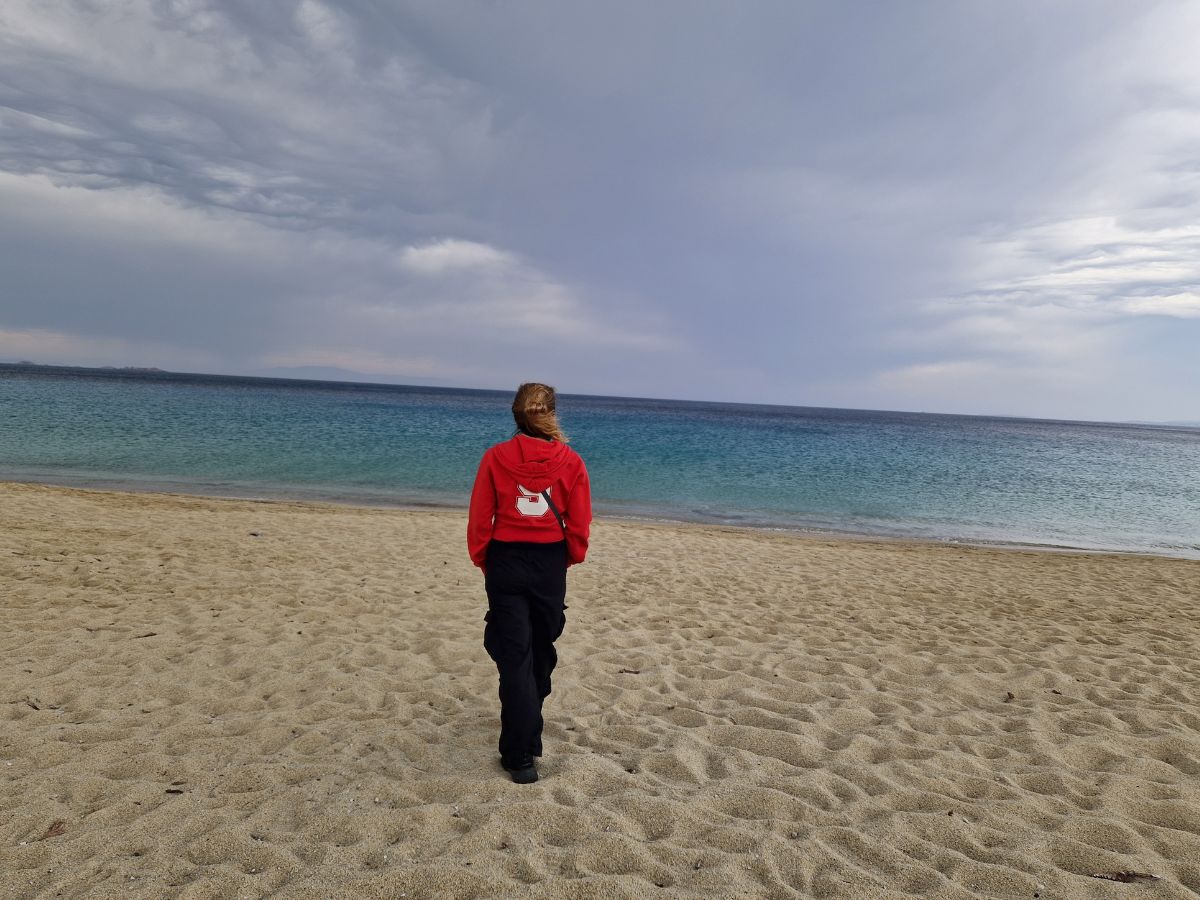
8. My bank card didn’t work
This is one of most people’s worst nightmares – having a bank card which, for some reason, refuses to work. It’s happened to me a few times, even with my Greek bank cards, mostly on remote islands. It can happen to anyone, which is why it’s always safer to have some cash, just in case.
Have a look at this guide about money in Greece. We’ve included tips on ATMs, conversion rates, which cards to use, and lots more information. Also, here is an article about tipping in Greece.

9. I got seasick
Did you think that Greeks don’t get seasick? Well, I can assure you that they do 🙂 Although I rarely get seasick, it’s happened to me a few times in my life, on particularly windy days. It’s a horrible feeling, especially when you have a long ferry trip or boat trip ahead.
The common medication for sea-sickness is dramamine, which, however, makes you drowsy. In the last few years, I’ve discovered ginger tablets, which are literally a life-saver. It’s definitely a thing to consider bringing with you – or you can get them in many pharmacies in Greece.
Overall, the smaller ferries are worse to travel on on windy days, and they are more likely to get cancelled. This is why I always suggest taking the slower ferries, even more so if you have sea-sickness issues.
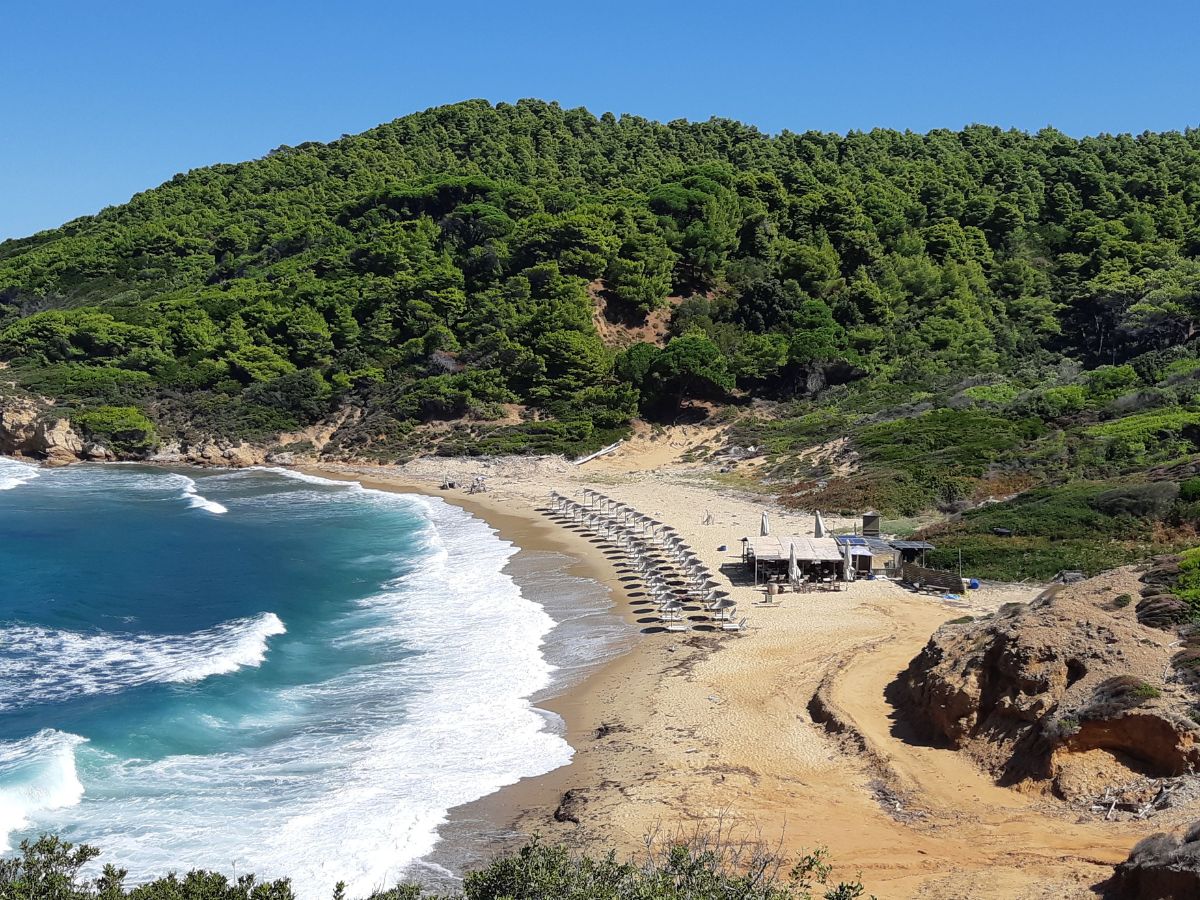
10. I stepped on a sea urchin
Have you heard of sea urchins? They are small creatures that live under the sea, and they are covered in spikes. Being Greek, I’ve sadly stepped on my fair share of sea urchins.
While it’s rarely dangerous, stepping on an urchin is no fun as it hurts a lot. Removing the spikes is a long, tedious and very painful process. I know people who have ended up in hospital as the spikes are rarely easy to get rid of.
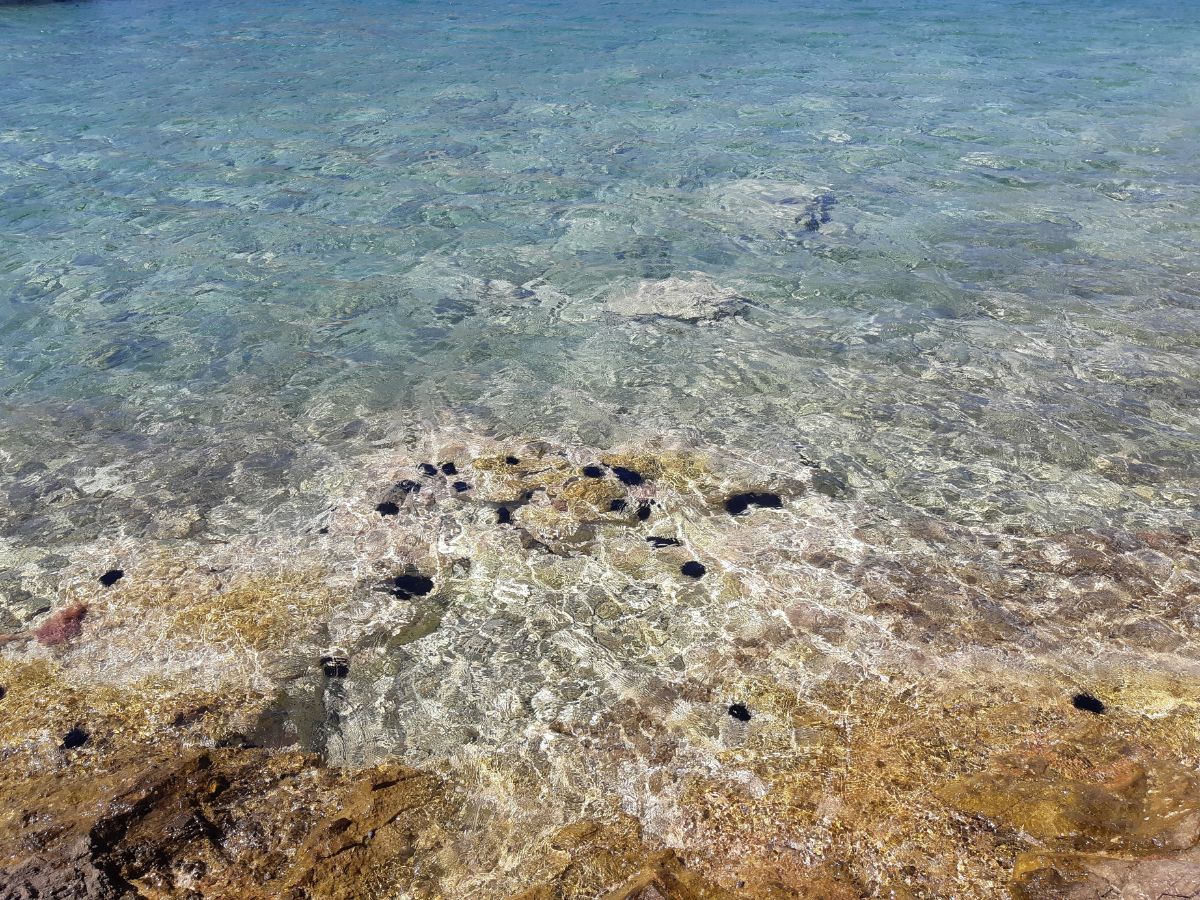
I’ve also heard of people who slipped in the sea, and sat flat on an urchin. I’m extremely grateful that this hasn’t happened to me, as I am not even able to imagine the pain.
Verdict: consider wearing water shoes when you go to Greek beaches that are not sandy. You can find these on most Greek islands, or you can pre-order water shoes on Amazon. They are inexpensive, and you will find them useful in many occasions.
What to do if you step on a sea urchin
I hope you never ever do, but here is what to do if you step on a sea urchin:
- Soak your foot in hot water for an hour or so. The skin will then become softer, and it will be easier to remove the spikes.
- Use a combination of a disinfected needle and a pair of tweezers to remove the spikes. Unfortunately, this is easier said than done. Applying olive oil or vaseline may help.
- Once you’ve managed to remove the spikes, scrub the wound with soap and water and rinse it thoroughly.
- It’s best to leave the wound to heal on its own rather than covering it with a band-aid.
- In case the wound becomes infected, apply a topical antibiotic ointment, and head to the closest pharmacy, or find the nearest health center or hospital.
Disclaimer: Again, this is no medical advice – just me talking from experience. Whatever you do, avoid putting pressure on your foot, as it may drive the spikes deeper!
Another method I’ve heard of (but never used myself), is to rub your foot in very hot sand. Apparently the spikes will come out easily. I hope I never need to use this tip, but I’ll leave it here in case you are unlucky!

Have you ever had a mishap during your Greek vacation?
Have you ever had any issues during your vacation in Greece? I’d love to hear about them – please let me know in the comments!
More guides for Greece
- Twenty things to know about Greece before you visit
- What to pack for Greece
- How to plan your trip to Greece on your own
 Hi! I’m Vanessa from Athens and I love travelling around the Greek islands. I hope this guide was fun to read, but also offered some insight on mishaps to avoid during your Greek holiday.
Hi! I’m Vanessa from Athens and I love travelling around the Greek islands. I hope this guide was fun to read, but also offered some insight on mishaps to avoid during your Greek holiday.
Follow me on my social media:
- Facebook page and very active Facebook group
- Amazon
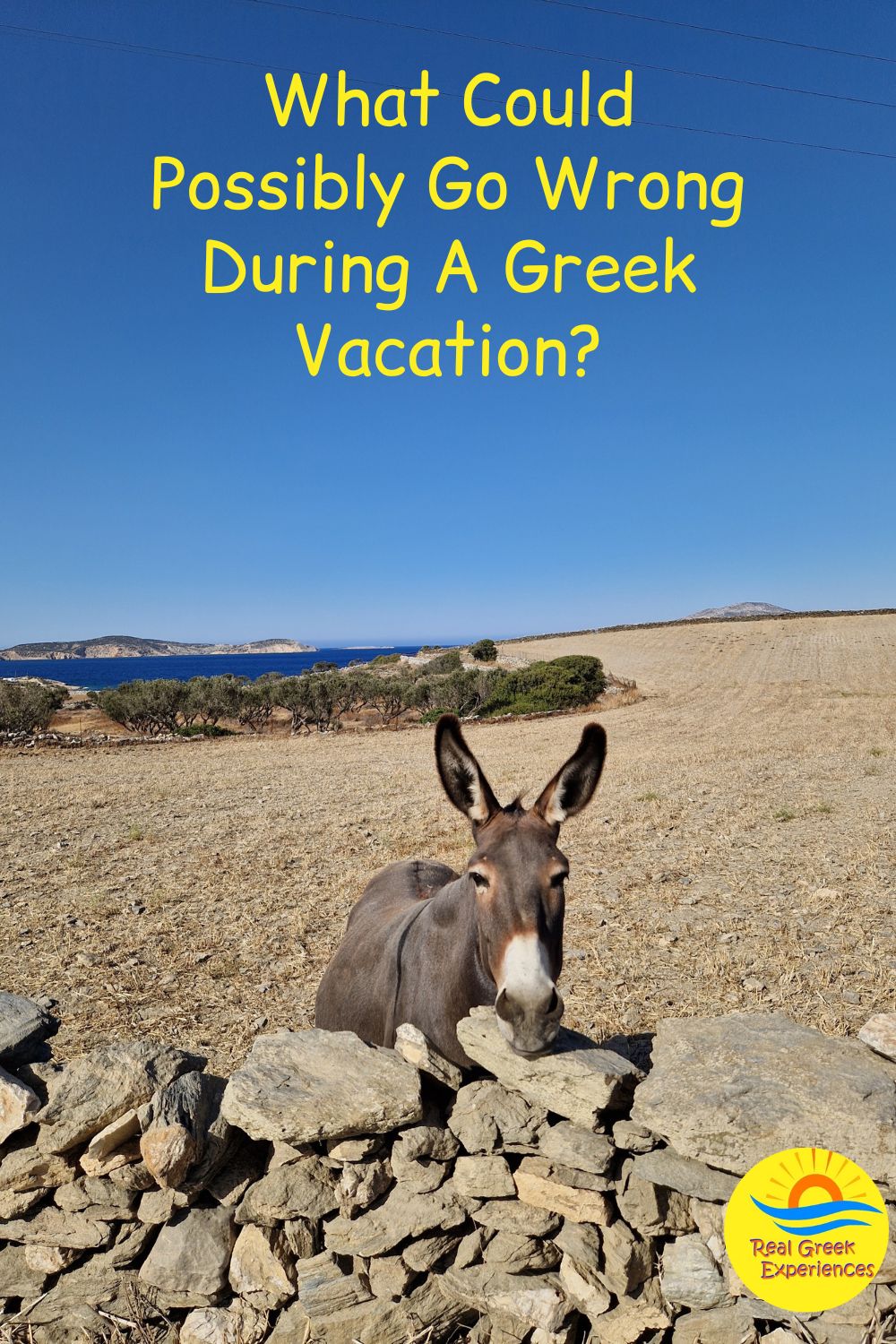

Yeah, we were on Thasos last year 2023 when a fire broke out in September. The wind was blowing it up to the village we were staying in so we drove to the fire to help with our water buckets. The wind changed and the aeroplanes came to help. Everyone should help put out the fires. The islands would be devastated without this help. The fire started as a result of a falling tree (from the 2023 drought) onto an electrical power line, the tree had not been cut shorter to prevent this. Such a lack of maintenance and land-water-fire management consideration. The beautiful islands are in grave danger, especially from all kind of corruption. God save the islands from this please.
On our second visit to Greece in the early 90s, we were on Kalymnos and my husband put too much weight on the toilet cistern early one morning, causing the thing to dislodge from the wall and spout water everywhere. As he was bearing the weight of it ….and soaked to the skin….I was dispatched to get help (both of us in pyjamas). I found the (very) old lady owner and managed to explain the
problem somehow and she came along to help carrying of all things a table knife to tackle the screws! It’s probably lost in the telling, but at the time it was both horrifying and hilarious! What an intro to Greece!
Hahah sounds like a fun memory 😀 Thanks for sharing!